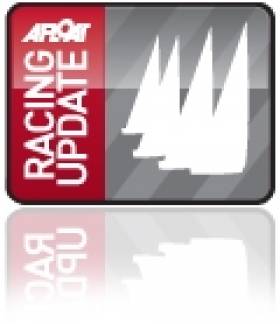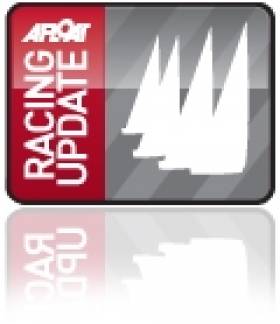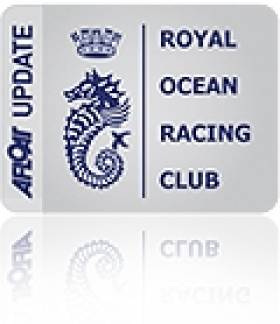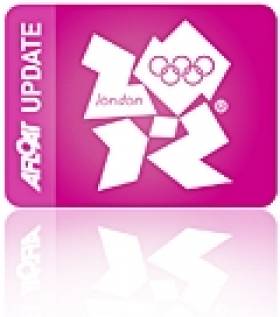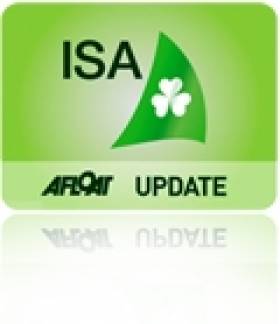Displaying items by tag: Anthony
Eighth Place Overall for O'Leary at New York Invitational Cup
Anthony O'Leary ended up in the same position as he started the New York Yacht Club Invitational Cup after yesterday's final rounds. The Royal Cork crew counted a 15 in the final race to end up eighth, the same as Monday's opening score. The sole Irish invitees were as high as sixth last Thursday.
In a reversal of fortunes from the inaugural event two years ago, the Terry McLaughlin-led team from the Royal Canadian Yacht Club persevered today to win the 2011 New York Yacht Club Invitational Cup presented by Rolex, sailed in Swan 42s. The New York Yacht Club team finished second, with the Annapolis Yacht Club team, third. The final race days' light and shifty conditions gave all 22 teams the opportunity to shift positions on the leaderboard, but in the end most just solidified what they had already earned.
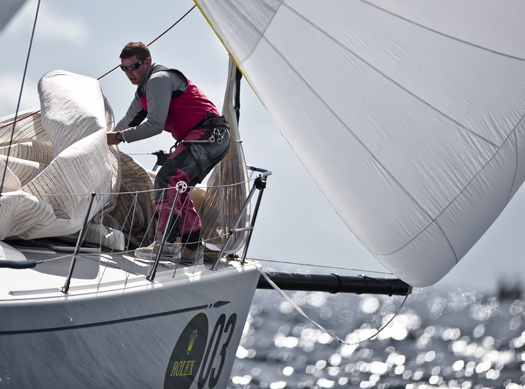
Royal Cork's entry finished eighth in New York. Photo: Kurt Arrigo/Rolex
The Canadian entry, skippered by Olympic medalist and former America's Cup skipper, Terry McLaughlin, went into the day – and the final race – with a ten-point lead over the New York Yacht Club entry. But the Canadians took charge from the start, McLaughlin recounted their strategy, "We decided to go after New York, but it was tricky. It was five knots at the start, but it was very, very shifty and puffy, so if we let them sail their own race and we had tried to sail our own race. There is a reasonable chance that they would have put ten boats between us, so we decided that 'ok listen' we've got to be near them. If we put them back at the start and we're back at the start than it doesn't matter and we couldn't lose.
"But, we still both had reasonable starts at the right end and we went right a little bit. Then they (NYYC) sort of got to us a bit, so I bailed left, but we happened to be in a great puff and gained on them a lot."
The Royal Canadian Yacht Club team, from Toronto, sailed a nearly flawless series with seven top five finishes – out of eleven races sailed. In races where the Canadians were deep in the fleet, McLaughlin, tactician John Togerson and crew inevitably overhauled the boats ahead. McLaughin said, "I think we came back quite well this series. Obviously yesterday was our best, going from nineteenth to sixth. Its important because you can't get off the line in great shape or get around the first mark in great shape, eleven races in a row."
The 55-year old sailor won a silver medal in the Flying Dutchman class in the 1984 Los Angeles Olympics and was the skipper of Canada I in the 1983 America's Cup challenger series. In fact, three of his current crew were holdovers from that Cup campaign. These days his business is importing clothing and footwear from Ireland, and his sailing more relegated to only occasional racing.
In a new addition to the event, the team leading in points at the end of each day flew a "gold" spinnaker in the following day's races. The Royal Canadian team quickly took that honor after the first day and never relinquished it for the week.
McLaughlin was quick to praise his crew, "It was a team effort. I mean, I make the final decisions, but I'm relying on guys that A) make the boat go fast and B) tell me what's going on."
Ken Colburn was skipper of the New York Yacht Club team, the only really viable threat to the Royal Canadian Yacht Club through the five days of racing, coming within five points midweek. Colburn was pleased, "You have to step back from this and say 'we came in second in this regatta to a team that was just doing everything well.' You've got to walk away from that pleased, with just slight disappointment that you didn't get all the way there. The Royal Canadian Yacht Club are the ultimate winner, and they deserve it."
Like many of the teams that only managed to get everyone in the same boat relatively late, the NYYC crew started sailing together for the first time over Labor Day weekend but, according to their skipper, they quickly gelled. Colburn from Marblehead, Massachusetts, was adamant that his crew was equally responsible for their success, "This is a team sport and I'm only driving the boat most of the time. I need tacticians and trimmers and strategists and bow people to do their jobs well, and they all did them superbly well. They were sportsmanlike, cordial, competitive, and always working to win, I couldn't be more proud of this team."
Peter McChesney, skipper of the Annapolis Yacht Club team which finished third, summed up what many competitors agreed, "It was certainly, arguably, the most unique, special, exciting regatta. The professional circuits, and Olympic campaigns, and lot of great one-design classes, but certainly this is a new unbelievable regatta with worldwide excitement."
While the North American teams dominated the top five overall positions, with Eastern Yacht Club, and Newport Harbor Yacht Club in fourth and fifth, the first international entry was the sixth-placed Japan Sailing Federation, skippered by Makoto Uematsu, followed by the Royal Ocean Racing Club (GBR), Royal Cork Yacht Club (IRL), Royal Hong Kong Yacht Club, and Yacht Club Argentino (ARG), rounding out the top ten finishers.
Following the success of the inaugural event in 2009, Event Chairman John Mendez and his Invitational Cup committee set to make several changes to improve the competition. Among these were changing to an all-amateur event, and on-the-water umpiring, both of which were unanimously well received by the competitors. Peter Shrubb, Chief Umpire from Bermuda, oversaw the ten-umpire team. Shrubb was pleased with the results explaining, "We're on the water and adjudicating any rule infractions. We can't catch everything, but we'd like to think we caught 95%. We resolve them on the water, and it saves the competitors having to file protests against each other – it take out of their hands, puts it into our hands and makes for a friendlier, more Corinthian event."
The final Rolex Awards Dinner was held under the marquee on the New York Yacht Club's Harbour Court grounds. Competitors and guests enjoyed dinner and dancing overlooking Newport Harbor.
The Royal Canadian Yacht Club team, overall winner of the Invitational Cup were awarded a Rolex Submariner timepiece and presented the Invitational Cup trophy, which was commissioned by NYYC Commodore Robert James and past NYYC Trustee, Charlie Robertson.
NYYC's Harbour Court hosted 22 yacht clubs – representing 16 nations from six different continents – for the second edition of this biennial event. Racing was conducted in NYYC Swan 42s on Rhode Island Sound and Narragansett Bay from September 10-17, 2011. The next edition of the New York Yacht Club Invitational Cup presented by Rolex will be held in September 2013.
Final Results – 2011 New York Yacht Club Invitational Cup
1) Royal Canadian Yacht Club, Canada, 47 points
2) New York Yacht Club, USA, 67 points
3) Annapolis Yacht Club, USA, 72 points
4) Eastern Yacht Club, USA, 89 points
5) Newport Harbor Yacht Club, USA, 105 points
6) Japan Sailing Federation, Japan, 105 points
7) Royal Ocean Racing Club, Great Britain, 112 points
8) Royal Cork Yacht Club, Ireland, 115 points
9) Royal Hong Kong Yacht Club, Hong Kong, 120 points
10) Yacht Club Argentino, Argentina, 121 points
11) Royal Yacht Squadron, Great Britain, 122 points
12) Nyländska Jaktklubben, Finland, 127 points
13) Cruising Yacht Club of Australia, Australia, 133 points
14) Clube Naval de Cascais, Portugal, 137 points
15) Norddeutscher Regatta Verein, Germany, 138 points
16) Royal Bermuda Yacht Club, Bermuda, 144 points
17) Royal Cape Yacht Club, South Africa, 148 points
18) Itchenor Sailing Club, Great Britain, 150 points
19) Royal Norwegian Yacht Club, Norway, 154 points
20) Yacht Club Capri, Italy, 167 points
21) Real Club Nautico de Barcelona, Spain, 197 points
22) Yacht Club Punta Ala, Italy, 220 points
Royal Cork Move up to Seventh in New York
Royal Cork Yacht Club is seventh overall after scoring an impressive third place in yesterday's race nine of the New York Invitational Cup. The Anthony O'Leary skippered yacht moved from tenth to seventh after scores of 3 and 12 in the penultimate day of the competition yesterday. The Crosshaven crew is five points behind sixth place Japan, a team that have consistently held an advantage over the Irish crew this week.
The New York Chamber of Commerce could not have arranged a more spectacular day for the 22 competing yacht club teams, representing 16 nations from six continents, than what was delivered today after a cold front that passed through the area overnight left behind a classic New England fall day to tantalize competitors at the 2011 New York Yacht Club Invitational Cup presented by Rolex. And after sailing eight races over three days on courses set north of Newport's Pell Bridge, with the breeze from the north-northwest, and an ebb tide, the race committee made the decision to send the competitors out of the now-familiar Narragansett Bay to Rhode Island Sound for two races on the penultimate day of the series.
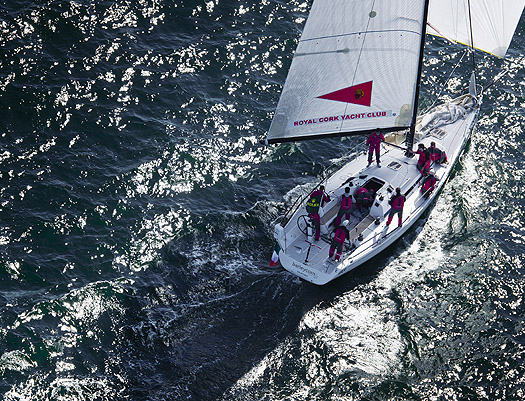
Royal Cork YC's entry in the New York Cup skippered by Anthony O'Leary with tactics from son Nicholas Photo: Rolex/Kurt Arrigo
Remarkably, the first race of the day saw yet another yacht club team winning a race. Eastern Yacht Club became the ninth race winner, in nine races, when they took over the lead early in the race and held it all the way to the finish line.
"It was a good one," said Bill Lynn, helm of the Eastern Yacht Club team of the race as he explained that the EYC sailors liked the conditions today. "I think we're fast , but I don't think we're the fastest boat here, so I think getting out into some shifty, variable breeze with not perfectly flat water, suits our style in these boats a little better. We finally got a great start, which is kind of nice. It was probably our best start of the series so far, and then we just were patient. When we came off the windward end [of the starting line] and tacked onto port there were an awful lot of boats on port way up inside us. It looked grim there for a while. But we were going to stick to our guns and wait it out. And we did, and the righty finally came in at the end and got us around the mark in third and then after that it was playing the shifts [to stay at the top]."
When Lynn's team got through the first gate, they split with the Royal Yacht Squadron. "Fortunately we sent them around the wrong gate and we went around the right gate. When the breeze shifted back left we were crossing them. After we went through the gate and started going back upwind it got super windy, our gage was showing low 20s, and it stayed that way for the rest of the race. When it [the breeze] came smoking back in half-way through, that wasn't in anybody's forecast."
Lynn went on to explain that in a northwest breeze, you have to sail your own race and not worry too much about the other boats. "You almost have to pretend there are no other boats on the course. It's not about winning every race in a northwester, its about not blowing one." For race two, Lynn characterized Eastern's start as good, but in the wrong place on the line. They would go on to finish sixth, and now have 82 points on the scoreboard to stand fifth overall, while tied on points with Newport Harbor Yacht Club which is currently fourth.
For the second day in a row, the final race of the day has been won by the Clube Naval de Cascais (CNC) from Portugal, making them the first team in the 10 races to repeat as a winner. At the helm of CNC is Patrick Monteiro de Barros, whose varied sailing resume includes representing his country at the Olympic Games (twice), as well as circumnavigating the globe (twice). CNC placed 21st in the earlier race today, and with 128 points lies 16th overall.
It would certainly seem that the artic air from home brought additional good fortune for Royal Canadian Yacht Club (RCYC), as they maintained their grip on the top-position in the overall standings. With finishes of 6-11 today, they not only have 46 points but also have increased the spread to 10 points over New York Yacht Club which has 56.
Annapolis Yacht Club has moved up to third overall on 68 points after finishing 4-2 today. Tactician John Torgerson compared the flukey conditions the AYC team is used to in Annapolis with what they saw today on Rhode Island Sound. "It was super-shifty for a while and we like that," said Torgerson. "We had a good idea of what we were going to do off the start and we executed it. For the first race it was light at the start. We saw as little as nine [knots] to as much as 22, it was a huge range. You just had to be able to shift gears. We have guys that are really good at figuring it out." AYC's strategy for the final day of racing is to "just go out and sail" and hope that the two teams above and below them take each other out.
The eleventh and final race of the series will be held tomorrow, Saturday, September 17, and is scheduled for 1100. It will be preceded by the fleet parading through Newport harbor at 0900, with competitors leaving NYYC's Harbour Court at approximately 0830. The winner of the 2011 New York Yacht Club Invitational Cup presented by Rolex will be confirmed at the conclusion of racing.
Antix Finishes Second at British IRC Championships
Royal Cork's Antix skippered by Anthony O'Leary has finished as runner up in the IRC 1 division at a heavy weather staging of the British IRC Championships this afternoon.
With eight bullets in eight races, Peter Rutter and the crew of the Grand Soleil 43, Quokka 8, comfortably secured the 2011 IRC National Championship title as well as victory within IRC 2.
"I am incredibly proud - my crew have really worked their hearts off," said Rutter. "I have never been able to win this regatta before and I said to them 'we have to nail it this time' and they have worked their cotton socks off. So I am very very pleased and it is nice to have got this one finally put away. The boat is going well, the sails are good and the crew work has been stunning."
Matters were made no easier for the crew after Quokka 8's skipper unwisely chose light and moderate weather kites for this regatta, which has typically seen the wind rarely drop below 20 knots. Rutter paid his respects to the RORC race committee for laying on a good series, also admitted that being one of the fastest boats in Class 2 also helped. "It was the place to be, in winds of this strength - it helped you get clear wind. But keeping the boat under the rig was the important thing in this regatta!"
One of the favourites in IRC1, Jonathan Goring's new Ker 40, Keronimo, put this to the test today when on the final run of the second and final race, she was nailed by a squall, causing her to re-enact the famous pitchpole of Silk II (as captured on camera by Beken of Cowes). Tactician Simon Shaw recounted what occurred: "A big black cloud was chasing us down the run and we'd just changed on to the no4 and gybed to come into the mark when the front of the gust hit and the wind went from 26 to pretty much 40 knots...
"The boat instantly jumped into the wave we were following. The rudder was fully out of the water. It was a bit like watching one of those Extreme 40 capsizes - you are on top of the world looking down at the boat, holding on to the runners with your legs dangling down into the cockpit going 'hang on I thought this only happened on catamarans!'"
Keronimo teetered in her pitchpoled position for what seemed like 10 seconds, her bow buried so deeply into the water that the instrument displays on her mast were submerged, until eventually the fitting at the end of her bowsprit exploded and the chute roared aft destroying all the stanchions along her starboard side. "We lost one guy off each side and one off the bow," continued Shaw. "So we scooped everyone back in, wrestled the chute down over the back, pulled the jib up, bore away and carried on with the race." Thankfully no one was hurt in the incident.
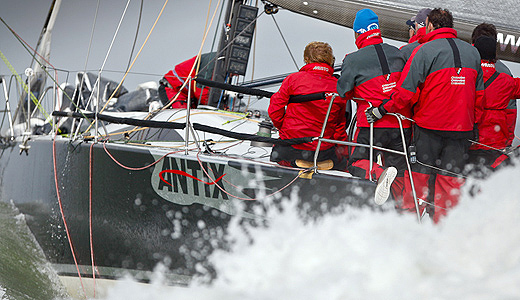
Royal Cork's Antix finished second in Cowes this afternoon. Photo: Paul Wyeth
Victory in the hard fought IRC 1 was deservedly scooped up by the winner of both today's two races, Piet Vroon's Ker 46 Tonnerre de Breskens 3, also winner of the Jackdaw Trophy for coming second overall under IRC. Anthony O'Leary's Antix finished just a point adrift in second in IRC 1, ahead of third placed Keronimo.
Another equally unusual incident occurred prior to the start of today's first race on board Peter Morton's MAT 1010, one of the contenders in IRC 3, when her port cabintop window imploded. The exact reasons for this remain a mystery. but Morton believes the window was weakened by a barber hauler block repeatedly rapping against it and broken terminally when the weight of one of the crew was applied to it. In the brisk conditions they were forced to retire.
In IRC3 today's winner, claiming both races, was Michael Brough's Bavaria Match 38 Steady Barker, but even this fine show left them three points adrift of Mike Bridges' Elan 37, Elaine, the class victor.
Brough, who has been toughing it out since he twisted his knee during racing yesterday, says Steady Barker enjoys light or heavy airs and in this regatta they have seen more than their fair share of the latter.
Their racing today was also not without incident. "Before the start of the second race our mainsail ripped luff to leech," said Brough. "We just got it down, put some duck tape over it and it managed to make it all the way." Fortunately when the squall hit on the last race they were sailing upwind and the most they saw was 32 knots. Even so they decided to play it safe on the final run and chose not to hoist the kite. "We thought we'd see if anyone blinked before we put the kite up," admitted Brough. "Fatjax tried it and went over on her side. Even so we were doing 10.5-11 knots without the kite."
IRC 4 saw Adam Gosling's Corby 30 Yes! claim two bullets to win their class overall, albeit just three points ahead of Michael Kershaw's Half Tonner, Chimp.
Generally of this RORC IRC Nationals Brough observed: "The races have been great. Everyone is absolutely shattered on the boat, including the bowman. It has been hard racing and I'm glad RORC stuck with it rather than just canning it."
Vidcast - Max Treacy and Anthony Shanks, Star Duo
It's never easy stepping back in to a boat and finding your competitive edge again. It's even harder if it happens to be an Olympic class. On coming ashore after another windy Star race at the Skandia Sail for Gold regatta yesterday, Dun Laoghaire's Max Treacy concedes he 'never really expected to win the Irish Star keelboat trials this time around'. So far the Royal St. George pair have struggled to break in to the top half of the fleet.
Treacy and Peter O'Leary squared up for the right to represent Ireland next July at the Olympic Regatta in Weymouth but after winning the first trial in Holland ten days ago O'Leary has extended his lead this week.
Treacy, who has clocked up 12 years experience in the class and some impressive international results, says exam pressure kept him off the water this year. Together with his crew Anthony Shanks, the pair are now looking forward to the Star European championships on Dublin Bay in September, the 100th anniversary year for the class and the first time the Olympic keelboat has ever raced in Ireland.
Sailing Body Elects First Female President
In one of her last official functions as Minister for Sport, outgoing local TD Mary Hanafin attended the Irish Sailing Association's annual Ball last Saturday in the Royal Marine Hotel in Dun Laoghaire.
Attended by 315 people the black tie ball featured an awards ceremony that has been hailed 'a great success' by the association.
On Saturday afternoon the association elected a new President, Niamh McCutcheon, the first female ISA President since the organisation was founded in 1945.
A collection in aid of the RNLI raised over €2,250.
Award details below:
ISA Sailing Achievement of the Year
This award is presented by the ISA to recognise the outstanding achievement in a sailing craft by an Irish person or in Ireland during 2010.
Winner: Nicholas 'Nin' O'Leary, Royal Cork Yacht Club
Nicholas' achievements included narrowly beating his father Anthony at the ISA All Ireland Championships in 2010 by just a single point after a nail-biting finale in difficult conditions off Kinsale in November. The win made it three-in-a-row for this remarkable young 24 year old sailor - the only person to achieve this in the 64 years of the event's history.
ISA Volunteer of the Year
This award is given to a member of an ISA affiliated club or class who has made a significant voluntary contribution to their sport during 2010.
Winner: Brian Craig, Royal St. George Yacht Club.
Brian has been nominated by the Royal St. George Yacht Club for the vital role he has played in developing sailing in Ireland and specifically Dun Laoghaire over the past 40 years. His most recent success was winning the bid for Dun Laoghaire to host the 2012 ISAF Youth Worlds.
ISA Youth Sailor of the Year
This award is presented by the ISA to recognise the outstanding achievement by a sailor competing in ISA Performance Pathway boats during 2010.
Winner: Finn Lynch, Blessington Sailing Club
Placing 2nd overall at the Topper World Championships in 2010 left the Carlow sailor in good stead for a Youth Sailor nomination. A determined sailor and strong character, it's clear that with these strengths Finn has the potential to go far in our sport.
ISA Instructor of the Year
This award recognises the role instructors have in providing access to our sports. The final 5 have been nominated by their students with the ultimate winner selected by an ISA judging panel.
Winner: Aine Carroll, Rush Sailing Club
Aine has been an ISA instructor for the last 11 years, instructing both adult and junior sailors in Rush Sailing Club. A keen Mermaid sailor, her love of sailing, her enthusiasm for the sport and willingness to give her time to her sailors have been infectious and remarkable. Apparently the kids at the club think she is a 'legend' and 'cool'!
ISA Training Centre of the Year
The face of ISA water sports to thousands of participants. The best in 2010 as nominated by their students.
Winner: University of Limerick Activity Centre
Situated on the sheltered shores of Lough Derg, University of Limerick Activity Centre has been in operation for over a decade. ULAC provides a varied programme of adventure activities to the general public. The University of Limerick Activity Centre runs ISA courses in sailing dinghies, windsurfers, powerboat as well as emergency care training courses.



























